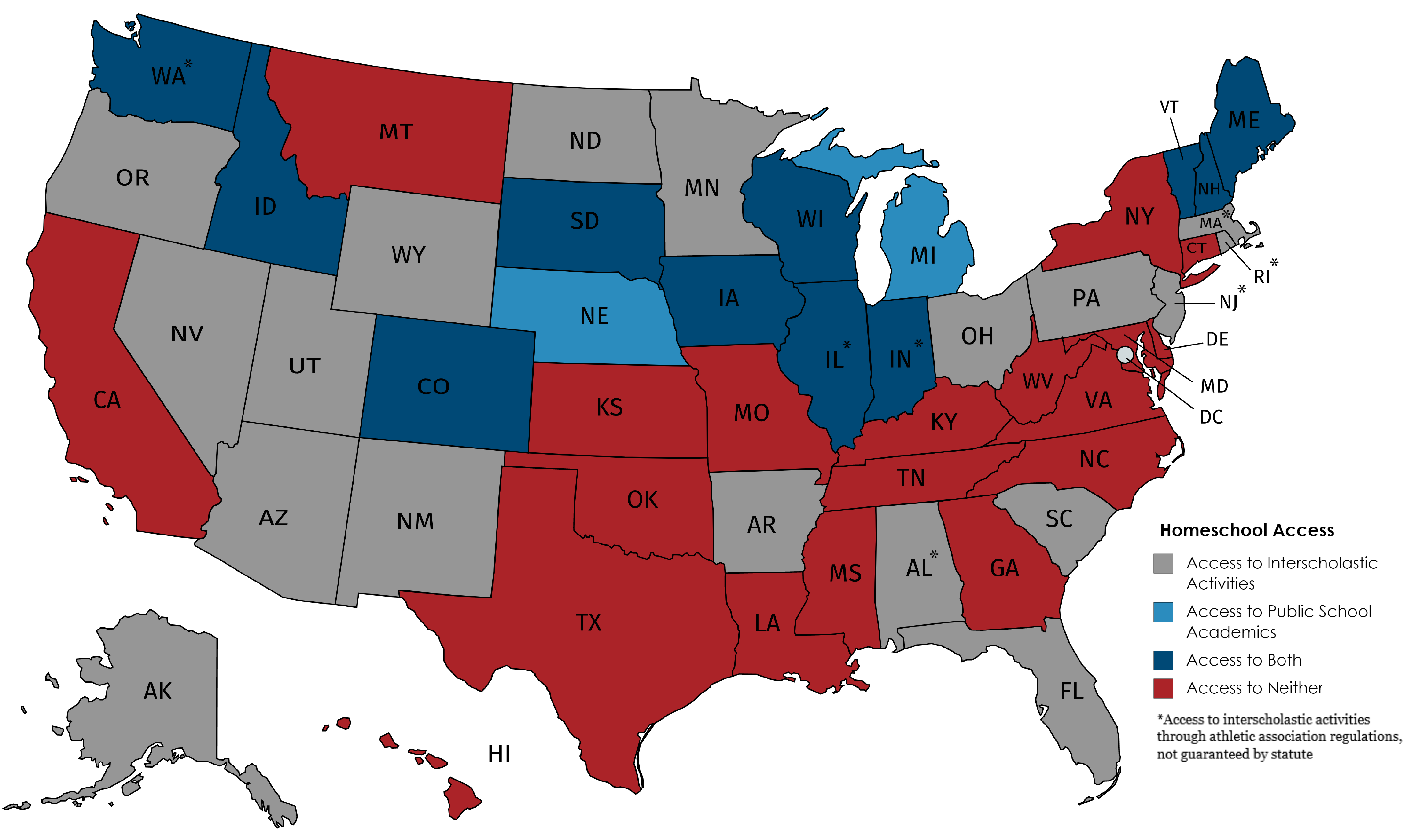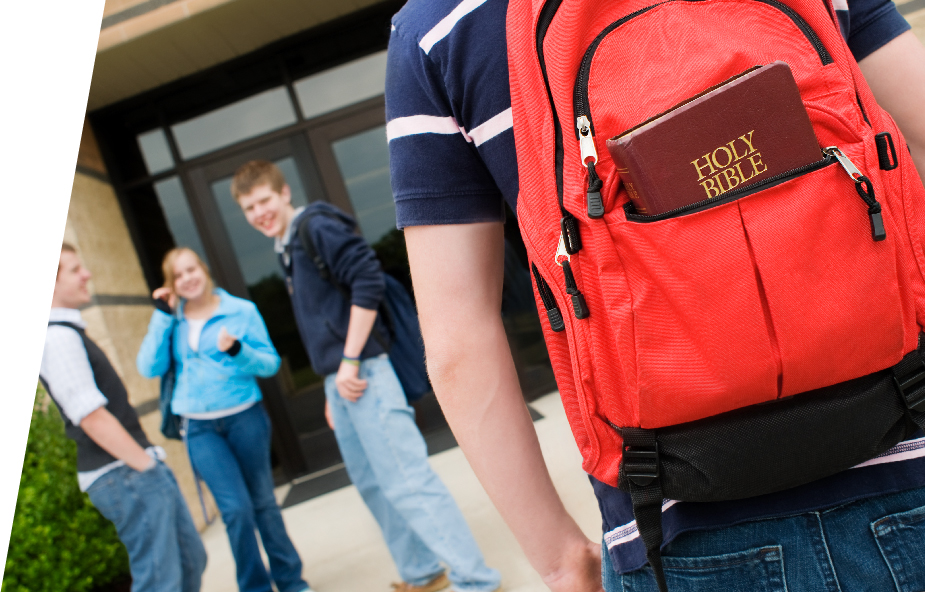Kansas Family Voice knows that the best education system is one that gives children a wide-open future and fuel to explore God’s calling in their lives, under the loving and protecting guidance of their parents.
Parents know their children best and are in the best position to make decisions about their children’s education. Kansas Family Voice advances policies that provide more opportunities for parents to build an education best suited to meet their children’s unique needs. This means we support legislation that enhances school-choice opportunities for families. A future full of choices for children needs a present full of options.
A school environment should not be harmful to a child. It should not tell a child that her faith isn’t welcome in the classroom. Parents are the key to ensuring that a child’s educational environment does not undermine the family’s faith — or their child’s future. They have the right to be informed about what’s happening in their children’s schools, and what curriculum their children are exposed to. We advance policies that empower parents to have decision-making power when it comes to their children’s classrooms.

THE STORY OF EDUCATION IN AMERICA
For the majority of the first century of America’s existence, a large portion of American children were educated at home or in local schools run by their community.
In the early 20th century there was a push to ensure that everyone received the same basic education. Mandatory education laws grew in popularity in state legislatures with the goal that everyone would be able to read. While this goal was a good one, education moved further away from the family and local community. The centralization of education increased throughout the 20th century, and in 1979 the national Department of Education was officially made an independent cabinet agency.

EXPANDED CHOICE
As education became more nationalized, parents began to seek alternative education methods. Religious schools, primarily Catholic schools, have been around for decades, but the number of both nondenominational religious schools and schools associated with Protestant churches sharply increased in the 80’s and 90’s. Similarly, parents began to advocate for laws to ensure that they could homeschool their children. Overall, as the government pushed to nationalize public education, more and more parents began to look for educational models closer to home.
MORE SCHOOL CHOICE IS GOOD
Parents should be empowered to provide the best education for their children whether it is at public, charter, private, or home school. Kansas Family Voice and our state-based allies have worked tirelessly to increase school choice for the benefit of all students.
Below is a summary of the educational options now available to parents, though not all are available in all states.
PUBLIC SCHOOL
Public education, regulated by state and federal government, is available to all and has been used for good in many situations. Some states realizing the different needs of students have begun to offer options such as online educational programs, Advanced Placement courses, or dual-enrollment classes that give students a head start in college. Public school districts have also started to offer alternative high schools for trade-oriented students.
Even as public schools offer more choice, families are seeking alternatives because the public-education system exposes their children to ideas and opinions — imposed by the government — that are contrary to their family’s worldview. Concerned families desire to have a voice and be more involved in their child’s education.
HOME SCHOOL
The modern home school movement started as a reaction to the nationalizing of education. Families sought to take back their children’s education. Regulations on homeschooling vary by state, but today it is legal to homeschool a child in every state in the nation. It is estimated that almost 2 million students are educated at home. Homeschooling provides a family with an almost endless number of possibilities to tailor their child’s education to their child’s needs.
Co-ops allow students to take some classes at home, some in a private school, and even sometimes in a public school—depending on individual needs and goals. In some states, homeschool students are able to participate in extracurricular activities at public schools. Laws that give homeschool students the ability to access public extracurricular activities are known as Tebow Laws, named after Heisman trophy winner Tim Tebow, who utilized a similar law in Florida to play football in high school.
SEE IF YOUR STATE GIVES HOMESCHOOL STUDENTS ACCESS TO PUBLIC SCHOOL ACADEMICS AND ACTIVITIES.

CHARTER SCHOOL
Even in the public-school system, people began to realize that the one-size-fits-all method does not work for every child. Charter schools have begun to increase in number across the United States, providing parents and children options and expanded opportunities. A charter school does not charge tuition and is publicly funded. However, it operates independently from the public education system. Many of these charter schools have a particular educational focus or curriculum that is unique from nearby public schools.
PRIVATE SCHOOL
Private schools have also grown in popularity. Some private schools are associated with a particular church, while others are nonsectarian, such as a Montessori School or a traditional private school. These schools are often more expensive than other forms of education. Many parents may need financial assistance in order to enroll their children in this sort of education. Many programs have been created in order to assist parents in this endeavor.
PAYING FOR EDUCATIONAL CHOICE

EDUCATION SAVINGS ACCOUNTS
Education Savings Accounts (ESA) allow parents to receive a portion of their tax dollars back. The parents can then use the funds in the ESA to pay for certain expenses such as school tuition at a non-public school, homeschool curriculum, online education, or tutors. Six states — Arizona, Florida, Mississippi, North Carolina, Nevada, and Tennessee — have an ESA program. Some states restrict their ESA program to special needs students, bullied students, students from military families, or students from failing schools.

SCHOOL VOUCHER PROGRAMS
School-voucher programs allow parents to pay for tuition at a non-public school. Many of these programs are intended to be used by low-income students or students in failing schools. Vouchers are different than ESAs because they are normally directed at tuition cost only and are designated to be spent at a specific school. Fifteen states have voucher programs. The states are Arkansas, Florida, Georgia, Indiana, Louisiana, Maryland, Maine, Mississippi, North Carolina, New Hampshire, Ohio, Oklahoma, Utah, Vermont, and Wisconsin.

TAX CREDITS & SCHOLARSHIPS
Individual Tax Credits allow parents to receive a credit on their state taxes for their children’s educational expenses. This helps to ease the burden of paying for a public-school alternative. Five states have these types of programs.
Tax Credit Scholarships allow an individual or a business to receive credit on their taxes for donating to private nonprofits that provide students with scholarships to private schools. Eighteen states have tax scholarship programs.
RELIGIOUS FREEDOM IN EDUCATION
Religious expression in schools, and especially any indication that the government might be funding religious expression in education, has been attacked in the courts.
FUNDING OF RELIGIOUS SCHOOLS
As part of our nation’s historic anti-Catholic bias, in 1875 James Blaine introduced a proposed amendment to the Constitution to prohibit government from funding religious schools. Thankfully, the anti-religious freedom “Blaine amendment” failed at the federal level, but similar language has been adopted by 37 states. More recently, legislators have questioned the constitutionality of education-savings accounts, vouchers, tax credits, and other attempts to help parents choose the best options for their children — thankfully the policies advancing school choice have continually been upheld by the courts.
Everson v. Board of Education
Some states are trying to reduce the age of minor consent so that parents are eliminated from a child’s healthcare decisions.
ACSTO v. Winn
Some states are allowing teen girls and younger to get abortions without a parent’s knowledge or consent.
Mueller v. Allen
Hospitals are giving doctors the right to remove life-sustaining treatment from children without parental notice or consent.
Trinity Lutheran v. Comer
Courts are removing children from the custody of their parents when parents object to gender transition for their child.
RELIGIOUS EXPRESSION IN SCHOOLS
Many atheist groups have worked to remove all expressions of faith in public schools citing the so-called “separation of church and state”.
Their efforts threaten the right of teachers and coaches to pray or discuss their faith at school. They also threaten the right of students to carry their Bibles at school, discuss their faith, or form religious groups that meet on school property.
These outward expressions of faith arise from a teacher’s, coach’s or student’s personal relationships with Jesus Christ. Yet, they are being told that these natural expressions violate the Constitution—often an assertion that no legislation or court opinion has ever stated. When, in fact, what is being violated is their religious liberty.

FAITH AND FREEDOM IN EDUCATION
Education legislation we were involved in during the 2019 legislative session.
ANTI-BULLY “HOPE SCHOLARSHIP”
Called the “Hope Scholarship” and modeled off of an existing law in Florida, this bill would allow bullied students to receive funds to attend a private school of their choice in order to find a safer and better school environment.
Kansas H.B. 2150
UPDATE – HEARING CANCELED for California Bill That Could Force Your Kids to Be Advocates for Planned Parenthood
We have learned that tomorrow’s hearing on CA AB 624 (about which we alerted you just a few hours ago) has been canceled. CA AB 624 is legislation that could turn your child and your child’s school into advocates for the leading abortion provider in the country. This bill would require junior high schools, high
OREGON: Ask Governor Kate Brown to Veto Legislation Mandating LGBT Content in ALL School History, Geography, Economics and Civics Curriculums
We need your help! The Oregon legislature has sent to Governor Brown a bill that would shoe-horn controversial content on sexuality into all school history and government textbooks and all history, geography, economics, and civics classes! Oregon House Bill 2023 would require all history and government textbooks to include the “roles and contributions” of historical figures based not on their
ILLINOIS: Ask Governor Pritzker to Veto Legislation Mandating LGBT Curriculum in Illinois School Systems
We need your help! The Illinois legislature has sent to Governor J.B. Pritzker a bill that would shoe-horn controversial content on sexuality into all textbooks and all history classes! Your quick action is needed to help stop it. Illinois House Bill 246 would require all textbooks to include the “roles and contributions” of people based on their sexual preferences. House Bill
The Big Government Takeover of Your Child’s Curriculum
Today, H.R. 5, the so-called Equality Act—the bill that will manipulate schoolchildren to carry water for the LGBT agenda, whether their parents like it or not—heads to its first hearing in the U.S. House Education Committee. Tell Congress to Vote NO on H.R. 5! H.R. 5 is one of Pelosi’s top priorities for this year,
Planned Parenthood’s “Product”. . .
Planned Parenthood has been busy. Very busy. We all know what their primary money maker is, but did you know Planned Parenthood writes radical comprehensive sex education curriculums and lobbies for their inclusion in schools at governments around the world? What could this billion-dollar corporation have to gain through writing so-called “comprehensive” sex ed curriculums?
It’s Time to Take Back Our Kids’ Sexual Education
By Brittany Jones, Esq., policy manager for Kansas Family Voice Parents know their kids best. They know their moods, their sensitivities, their learning styles, and when they should be taught about things like sexuality. However, the government has largely decided that its job is to teach our children not just basic anatomy and biology, but
Giving Children a Wide-Open Future—And Fuel to Explore God’s Calling in Their Life
By Brittany Jones, an attorney and Policy Manager for Kansas Family Voice Parents, not faceless government officials, have the fundamental right and solemn duty to direct the education and upbringing of their children. Clear and simple. This is not only a guiding legal principle in our country, it is a reality lived out by parents
Your State’s Education Department – Do You Know What’s Going On?
“There is no way that my state would threaten my daughter’s safety by allowing boys in her bathroom.” Many parents in Rhode Island, Delaware, Pennsylvania, Michigan and Minnesota probably thought the same thing. Yet, these are all states where the state Department or Board of Education has decided to issue a rule mandating that schools
Education Choice for Families and a Wide Open Future for Their Kids
by Brittany Jones, policy manager and an attorney When I was growing up my parents simply wanted to know that I would make it to adulthood with the skills, knowledge and faith to make a difference in my small part of the world. My parents recognized early on that my brother got bored in a
SPEAK UP
We have the right, privilege and obligation to speak into every aspect of our government. Our Action Center makes it easy for you to do that.








